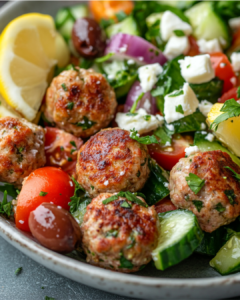Greek Turkey Meatballs are a delicious and healthy twist on traditional meatballs, offering a Mediterranean flair with each bite. Ground turkey serves as a lean protein base, while a combination of herbs, spices, and fresh ingredients like feta cheese and olives infuse the dish with authentic Greek flavors.
Originating from Greece, meatballs have a storied history and are often served as part of a mezze platter or as a main dish. They are traditionally made with beef or lamb, but the healthier turkey variant has gained popularity worldwide for its lower fat content.
This recipe is perfect for those seeking a nutritious meal without sacrificing taste. Not only are these meatballs easy to prepare, but they are also versatile, pairing well with a variety of sides like salads, rice, or pita bread.
For more authentic Greek recipes, you can explore resources like The Spruce Eats which offer insights into Mediterranean cuisine. Whether you’re cooking for family, friends, or just yourself, Greek Turkey Meatballs are sure to be a crowd-pleaser.
Ingredients for Greek Turkey Meatballs
-
- 1 pound ground turkey
- 1/2 cup breadcrumbs
- 1/4 cup crumbled feta cheese
- 1/4 cup chopped fresh parsley
-
- 1/4 cup chopped fresh mint
- 2 cloves garlic, minced
- 1 egg
- 1 tablespoon olive oil
-
- 1 teaspoon dried oregano
- 1/2 teaspoon salt
- 1/4 teaspoon ground black pepper
- 1/4 cup diced Kalamata olives (optional)
- Zest of 1 lemon

Instructions for Making Greek Turkey Meatballs
-
- Preheat your oven to 400°F (200°C) and line a baking sheet with parchment paper.
- In a large mixing bowl, combine the ground turkey, breadcrumbs, feta cheese, parsley, mint, garlic, and egg.
- Add the olive oil, oregano, salt, pepper, diced olives, and lemon zest to the mixture.
- Mix all ingredients thoroughly until well combined, but do not overwork the meat.

- Using your hands, shape the mixture into 1.5-inch meatballs and place them on the prepared baking sheet.
- Bake in the preheated oven for 20-25 minutes, or until the meatballs are golden brown and cooked through.
- Remove the meatballs from the oven and let them cool slightly before serving.

Nutritional Information
Greek Turkey Meatballs are not only flavorful but also packed with nutrients. Ground turkey is a low-fat protein source, making it an excellent choice for those monitoring their calorie intake. The addition of feta cheese provides a source of calcium and protein, though in moderation due to its fat content.
Herbs like parsley and mint are rich in vitamins A and C, and they also offer antioxidants that can combat inflammation. Olive oil, a staple in Mediterranean diets, is known for its heart-healthy monounsaturated fats, which can help reduce cholesterol levels.
These meatballs contain approximately 150 calories per serving, with about 10 grams of protein, 8 grams of fat, and 5 grams of carbohydrates. For more detailed nutritional information, consulting resources like NutritionData can provide further insights into the health benefits of each ingredient.
Overall, Greek Turkey Meatballs offer a balanced profile of macronutrients and are a wholesome choice for any meal.

Wine/Beverage Pairings With Greek Turkey Meatballs
Greek Turkey Meatballs pair wonderfully with a variety of beverages. A crisp white wine like a Sauvignon Blanc or a Greek Assyrtiko complements the bright and herbal flavors of the dish. The acidity of these wines balances the savory and slightly salty notes from the feta cheese and olives.
If you prefer red wine, a light-bodied Pinot Noir or a Greek Agiorgitiko will also work well, highlighting the meatball’s subtle flavors without overpowering them. For non-alcoholic options, a sparkling water with lemon or a mint-infused iced tea can be refreshing companions, enhancing the Mediterranean theme of the meal.
Cooking Tips and Variations
When making Greek Turkey Meatballs, there are a few tips that can enhance the dish’s flavor and texture. First, using fresh herbs rather than dried ones can make a significant difference in taste, imparting a more vibrant and aromatic flavor.
If fresh herbs are not available, substitute them with half the amount of dried herbs. Additionally, if you prefer a spicier kick, consider adding a pinch of red pepper flakes to the mixture. To ensure your meatballs are tender, avoid overmixing the ingredients as this can make them tough.
A light hand yields a lighter texture. For those who enjoy more texture, incorporating finely diced onions or grated zucchini can add moisture and a subtle sweetness to the meatballs. If you’re avoiding gluten, substitute the breadcrumbs with almond flour or gluten-free breadcrumbs.
These variations not only cater to different dietary needs but also provide an opportunity to experiment with flavors. Remember, the key to perfect meatballs is balance, so adjust the seasonings to your taste.

Serving Suggestions
Greek Turkey Meatballs are versatile and can be served in numerous ways, making them a great addition to any meal. For a traditional approach, serve them alongside a classic Greek salad composed of cucumbers, tomatoes, red onions, and olives, dressed simply with olive oil and lemon juice.
This combination not only adds freshness to the dish but also maintains the theme of Greek cuisine. Alternatively, these meatballs make a delightful filling for pita bread. Simply tuck them into warm pita along with some tzatziki sauce, shredded lettuce, and sliced cucumbers for a satisfying sandwich.
For a heartier meal, serve the meatballs over a bed of fluffy quinoa or rice, accompanied by roasted vegetables like bell peppers and zucchini. This not only provides a wholesome meal but also ensures a balanced intake of carbohydrates and vegetables.
Whether you’re preparing a mezze platter for a party or a simple family dinner, Greek Turkey Meatballs can easily adapt to suit the occasion.

Greek Turkey Meatballs Health Benefits
Greek Turkey Meatballs are a nutritious alternative to traditional meatballs, offering numerous health benefits. The use of ground turkey as the primary ingredient is beneficial for those looking to reduce their intake of red meat, as turkey provides lean protein with less saturated fat.
This can be particularly advantageous for heart health, as lower saturated fat intake is associated with reduced risk of cardiovascular diseases.
The herbs and spices in the recipe, such as garlic, oregano, parsley, and mint, not only enhance flavor but also contribute antioxidants and anti-inflammatory properties, which are beneficial for overall health.
Additionally, olive oil, used in the recipe, is a key component of the Mediterranean diet, known for its cardiovascular benefits and ability to improve lipid profiles. Feta cheese, although higher in sodium, adds essential calcium and protein, supporting bone health when consumed in moderation.
Overall, Greek Turkey Meatballs are a balanced dish that aligns with healthy eating patterns.
FAQs About Greek Turkey Meatballs
Can I freeze Greek Turkey Meatballs?
Yes, Greek Turkey Meatballs can be frozen. After baking, allow them to cool completely, then transfer to an airtight container or freezer bag. They can be frozen for up to 3 months.
What can I use instead of breadcrumbs?
If you’re looking for a gluten-free option, you can substitute breadcrumbs with almond flour or gluten-free breadcrumbs. Both alternatives work well to bind the meatballs together.
Can I make these meatballs without eggs?
Yes, you can make Greek Turkey Meatballs without eggs. Use a flax egg (1 tablespoon ground flaxseed mixed with 2.5 tablespoons water) as a substitute to help bind the ingredients.
Greek Turkey Meatballs are a delicious, healthy, and versatile dish that is perfect for any occasion. With their blend of Mediterranean flavors and lean turkey, they offer a nutritious and satisfying meal option. Whether you enjoy them as part of a mezze platter, in a pita, or with a side of salad or rice, these meatballs are sure to become a favorite in your culinary repertoire. Their simple preparation and the ability to adapt to different dietary needs make them an excellent choice for both novice and experienced cooks. Enjoy exploring the flavors of Greece with this delightful recipe.

